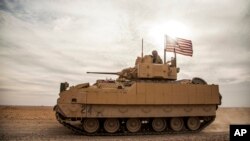France announced it will send light tanks to Ukraine, a French official said on Wednesday after a phone call between the two countries’ leaders.
French President Emmanuel Macron told Ukrainian President Volodymyr Zelenskyy that France would send light AMX-10 RC armored combat vehicles — a light tank model the French military has used since the 1980s but is being phased out — to help its war effort against Russia, the official said.
“The president [Macron] wanted to increase … aid” to Ukraine by delivering the AMX-10 RC light tanks, a Macron aide told reporters on condition of anonymity after the call. “It is the first time that Western-designed tanks are supplied to the Ukrainian armed forces.”
In his nightly video address, Zelenskyy thanked France, adding that Ukraine needed other allies to also provide heavier weapons.
“This is something that sends a clear signal to all our partners. There is no rational reason why Ukraine has not yet been supplied with Western tanks,” he said.
France did not say how many of the combat vehicles would be given to Ukraine.
U.S. President Joe Biden also said Wednesday that the U.S. is considering sending Bradley Fighting Vehicles to Ukraine.
While traveling in Kentucky, Biden was asked by reporters whether the U.S. was considering providing Ukraine with the Bradley, “a lightly armored, fully tracked transport vehicle that provides cross-country mobility, mounted firepower and protection from artillery and small-arms fire.”
The president said “yes,” without offering further comment.
Nearly 11 months ago, Russian President Vladimir Putin ordered the invasion of Ukraine, saying the pro-Western country needed to be “demilitarized” and “de-Nazified.” The United States and Western allies have criticized the military action and are providing financial and military aid while also leveling multiple rounds of sanctions against Russia.
France has provided Kyiv with state-of-the-art artillery, armored personnel carriers, anti-aircraft missiles and air-defense systems. And the U.S. has provided Ukraine with more than 2,000 combat vehicles, including 477 Mine Resistant Ambush Protected Vehicles and more than 1,200 Humvees, The Associated Press reported.
In December, Biden also announced the U.S. would for the first time send Ukraine a Patriot missile battery, the most advanced surface-to-air missile system the West has provided to help repel Russian aerial attacks.
Russia’s Putin dismissed the announcement of the weapons system, saying they were old and Russia’s missile systems would shoot them down.
“The Patriot air defense is outdated. An antidote will always be found. … Russia will knock down the Patriot system,” he said at the time.
Also Wednesday, National Security Council spokesperson John Kirby discussed the fighting in Ukraine’s Donetsk region, calling it “bloody” and “vicious.”
“The fighting there in the Donbas has been quite intense in recent weeks, and it’s pretty clear to us, and certainly clear to the Ukrainians, that the Russians continue to flow manpower in to try to tip the balance there, particularly in the Donetsk area,” Kirby said.
“Though winter is upon us, the fighting has not stopped and the fighting in the east has been particularly intense in the last several weeks,” he added. “And I think we need to expect that that kind of fighting will continue for quite some time.”
Earlier this week, Ukraine struck Russian military barracks in the Russian-held eastern Ukrainian town of Makiivka. At least 89 Russian soldiers were killed, and Moscow sought to blame the soldiers’ use of mobile phones for giving away their location, allowing for the strike.
Britain’s defense ministry also said Wednesday that the attack may have been exacerbated by Russia storing ammunition close to where Russian troops were staying.
“Given the extent of the damage, there is a realistic possibility that ammunition was being stored near to troop accommodation, which detonated during the strike, creating secondary explosions,” the ministry tweeted in its latest daily assessment.
The British defense ministry added that Russia had a history of unsafe ammunition storage before it launched its invasion of Ukraine, “but this incident highlights how unprofessional practices contribute to Russia’s high casualty rate.”
Some information for this story came from The Associated Press, Agence France-Presse and Reuters.

